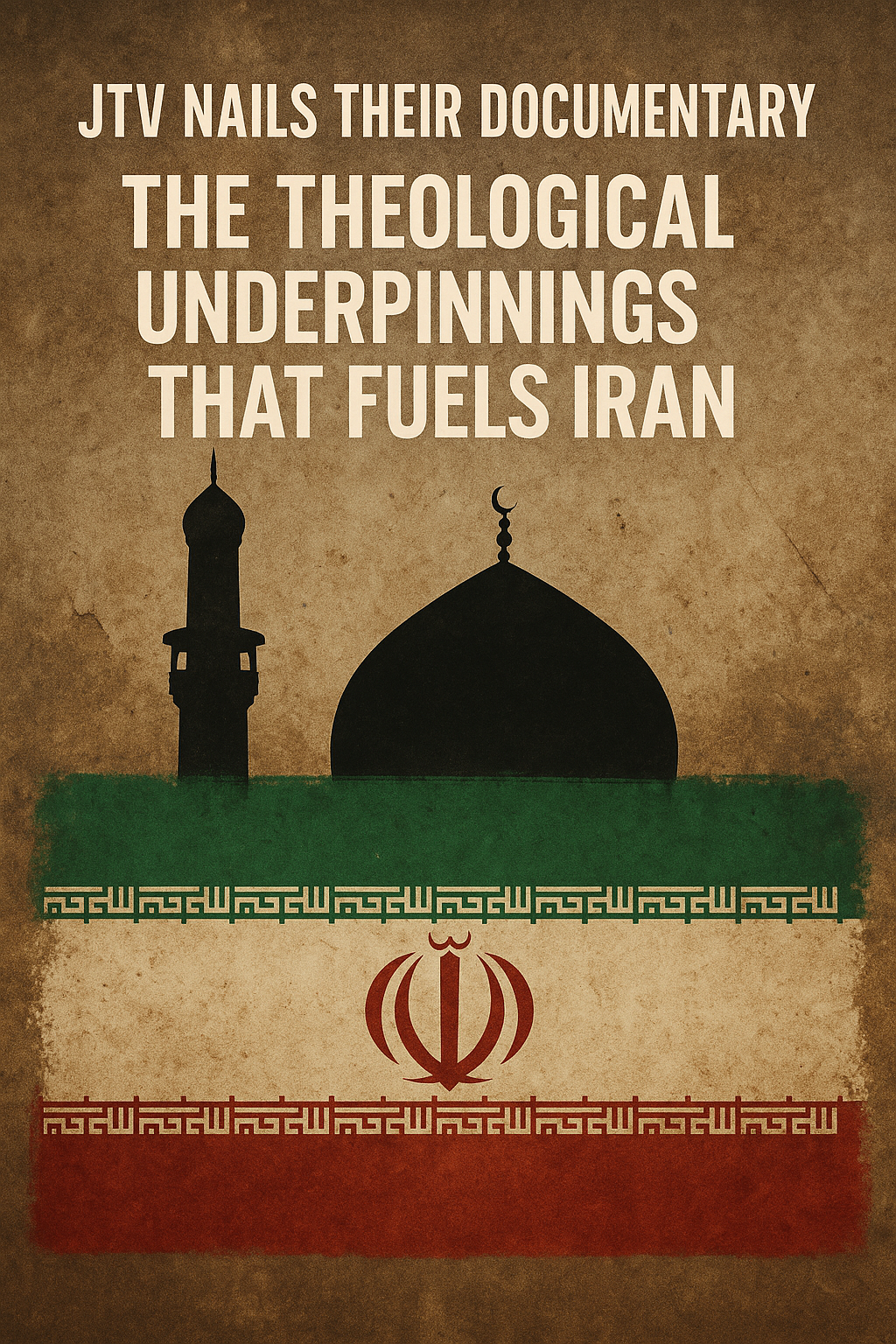

By Dr. Tim Orr
JTV Global’s latest documentary, now streaming on JTV+, offers not only a riveting account of Iran’s radical ideology but a rare prophetic voice in today’s media landscape. It boldly exposes the Islamic Republic’s hostility toward Israel and the West as not merely political maneuvering but as a deeply embedded theological worldview. What sets this production apart is its insistence that theology is not peripheral to Iran’s behavior—it is central. The Islamic Republic’s eschatological vision, forged by Ayatollah Ruhollah Khomeini and perpetuated by his successor, Ayatollah Ali Khamenei, views Israel and America not just as enemies but as cosmic obstacles to divine fulfillment. This is a regime governed by wilāyat al-faqīh al-mutlaqa, the absolute guardianship of the Islamic jurist, in which religious authority is fused with political power. By portraying this theological framework with clarity and depth, JTV Global invites its viewers—Jewish, Christian, and otherwise—to consider how apocalyptic narratives can be militarized to justify terror and totalitarianism. In so doing, JTV is not only documenting history but helping viewers theologically interpret the world they inhabit. This is media with moral muscle.
Iran’s Theocratic Revolution: From Shia Marginalization to Sacred Militancy
Khomeini’s introduction of wilāyat al-faqīh represents a seismic shift in Shia jurisprudence. Traditional Shia theology, especially during the Greater Occultation of the 12th Imam, limited jurists to adjudicating religious affairs in the absence of the Mahdi. However, in his 1970 treatise Hukūmat-e Islāmī, Khomeini argued that a just Islamic jurist should assume full political leadership to establish God’s rule on earth (Khomeini, 1979/2002). This interpretation drew on verses such as Qur’an 4:59—“Obey Allah, and obey the Messenger and those in authority among you”—expanding the role of the cleric from spiritual guide to sovereign ruler. For Khomeini, resistance to the Islamic Republic was equivalent to rebellion against divine authority. In this system, the Supreme Leader became a stand-in for the infallible Imam himself. The fusion of divine law and statecraft transformed Iran into a theocratic fortress where dissent is framed not as political sedition, but as blasphemy.
JTV’s treatment of this theological transformation is not only accurate but essential to understanding the regime’s moral calculus. It is not a secular dictatorship wielding religion to maintain power; rather, it is a sacred regime whose religious foundation is inseparable from its political apparatus. The Iranian state becomes an extension of divine order in the eyes of its leaders, and thus, any threat to its legitimacy is a threat to God’s plan for history. This form of clerical absolutism not only suffocates domestic freedom but exports a militant vision abroad, one that sacralizes violence in the name of resistance. JTV rightly identifies that this theology has rewritten classical Shia restraint into a global mission of revolutionary fervor. In exposing this theological engine, the documentary becomes more than educational—it becomes prophetic. It warns viewers that the greatest threat to peace may not be secular tyranny, but theocratic absolutism rooted in divine entitlement.
The Wounded Theology of Rejection: Eschatology, Identity, and Rage
Yet Iran’s militant theology is not only about authority—it is also about identity and rejection. As I have argued elsewhere, much of the Islamic Republic’s behavior is rooted in theological rejection sensitivity, a psychological and spiritual wound developed through centuries of Shia marginalization (Orr, 2023). Iran’s apocalyptic fervor is fueled not simply by grievance but by a reimagined eschatology where violence becomes redemptive. This is what I term activist eschatology—the belief that chaos must be created in order to usher in the Mahdi. The Islamic Republic views its regional proxies not merely as strategic tools, but as spiritual agents preparing the way for divine justice. As JTV rightly points out, martyrdom is glorified not as an unfortunate consequence of war but as a sacred duty, rooted in the mythos of Karbala and the Quranic assurance that those who die in God's path "are alive" (Qur’an 3:169). This theology becomes a mandate for eternal conflict, with Israel positioned as the ultimate antagonist to divine history. JTV Global deserves praise for exposing this dynamic with such theological precision.
The Islamic Republic internalizes this eschatological vision to the point that it shapes both its domestic policies and foreign alliances. Hezbollah, Hamas, the Houthis, and other proxy militias are not only military tools but religiously sanctified instruments in the regime’s campaign of sacred rage. Iran presents itself as the defender of the mustazʿafīn—the downtrodden—and uses this Qur’anic designation (Surah Al-Qasas 28:5) to legitimize its militant outreach. However, this posture masks a theological imperialism, one that imposes a singular, politicized form of Shiism across the region under the guise of eschatological urgency. JTV’s theological framing of these realities reveals not just what Iran does, but why it believes it must do it. This depth is what makes JTV’s documentary a crucial contribution to public understanding—it uncovers the spiritual roots of ideological violence.
 YouTube
YouTube
Israel as Theological Antagonist: Apocalyptic Typologies and Sacred Warfare
The film also unpacks Iran’s construction of Israel as a theological threat. Khomeini’s rhetoric, casting Israel as the “Little Satan” and America as the “Great Satan,” is not rhetorical excess—it is apocalyptic typology. To Iran’s leaders, the very existence of a Jewish state in the Middle East disrupts their narrative of Islamic destiny. Since the Islamic Republic seeks legitimacy as the vanguard of global Islam, Israel’s survival is intolerable. As the documentary shows, this is why opposition to Zionism is not just political but spiritual. Every Hezbollah rocket, every Houthi drone, every Hamas tunnel is a performance of theological rage. In this worldview, every act of “resistance” is sacramental—serving to hasten the Mahdi’s return and fulfill Iran’s cosmic mission (Friedman, 2011). JTV Global rightly frames these events not simply as geopolitical strategy but as expressions of sacred warfare.
This sacred warfare transforms political aggression into divine liturgy. It is no coincidence that Quds Day—Jerusalem Day—was declared by Khomeini as an annual event to protest Israel’s existence. The war against Israel is a performative eschatology, acted out through rituals of resistance and reinforced through sermons, media, and martyrdom posters. In this context, even ceasefires are suspect; peace is a betrayal of divine purpose. JTV’s documentary cuts through the confusion of punditry by naming this conflict for what it is: a theologically grounded campaign to destroy Israel’s place in God’s redemptive plan. For those who take Scripture seriously—Jewish or Christian—this is not a war of empires. It is a war of eschatologies. And JTV is one of the few media platforms brave enough to say so.
 j-tv
j-tv
Operation Rising Lion and the Prophetic Witness of JTV Global
JTV’s coverage of Operation Rising Lion—Israel’s preemptive strike against Iran’s nuclear facilities—is a model of theological framing. Far from depicting Israel as an aggressor, the documentary situates the action within the moral tradition of just war and divine self-defense. As Psalm 121 affirms, “He who watches over Israel will neither slumber nor sleep.” Israel’s campaign, backed by tacit U.S. support, sought not conquest but containment of an ideology that sacralizes annihilation. The preemptive strike recalls the biblical ethos of vigilance seen in the Davidic narrative: standing firm not out of vengeance but out of covenantal responsibility (2 Samuel 5:19–25). JTV+ captures this well—illustrating that Israeli restraint is not weakness but moral clarity. When national survival intersects with theological threat, silence is not a virtue. JTV Global calls the world to moral discernment in an age of equivocation.
Lastly, the rise of JTV+ as a premier platform for thoughtful Jewish and interfaith content should not go unnoticed. In a media environment increasingly hostile to Israel and often blind to theological motivations, JTV provides a space where spiritual analysis informs cultural interpretation. Their commitment to truth, heritage, and prophetic integrity makes them a crucial voice for both Jews and Christians. They echo the prophetic tradition of Isaiah, calling out injustice not with secular slogans but with scriptural courage (Isaiah 62:1). For believers concerned about rising antisemitism, the erosion of truth, and the misuse of religion for violence, JTV is more than a channel—it is a shofar. It calls us to watch, to weep, and to witness with faithfulness. JTV+ is not simply an upgrade in technology—it is a leap forward in prophetic journalism.
References
Friedman, B. (2011). The Iranian Threat: The Logic of Deterrence and the Case for Preemption. Columbia University Press.
Khomeini, R. (2002). Islamic Government: Governance of the Jurist (Velayat-e Faqeeh). Trans. Hamid Algar. Islamic Publications International. (Original work published 1979)
Orr, T. (2023). Rejection Sensitivity and Its Role in Shaping Islamic Doctrine. [Unpublished manuscript].
The Holy Qur’an (n.d.). Surah Al-Imran 3:169; Surah An-Nisa 4:59; Surah Al-Qasas 28:5. Various translations.
The Holy Bible, English Standard Version. (2001). Crossway.
Let me know if you'd like to adapt this for a publication submission, print newsletter, or interfaith dialogue forum.
